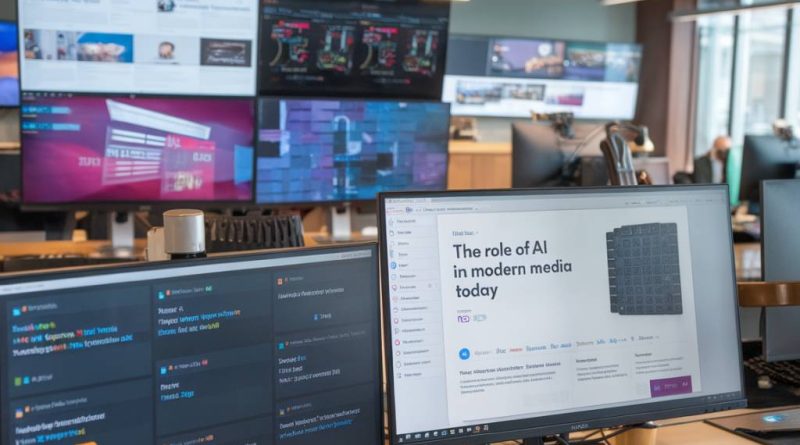With the advent of artificial intelligence (AI), the landscape of modern media has been significantly transformed. From content creation to audience analysis, AI is playing an increasingly pivotal role in shaping how information is disseminated and consumed. In this article, we will explore the multifaceted impact of AI on modern media today, highlighting key areas such as content generation, personalization, advertising, and ethical considerations.
AI in Content Generation
One of the most prominent applications of AI in modern media is content generation. AI-powered tools can now produce high-quality articles, blog posts, and even video content. Natural Language Processing (NLP) models like GPT-3 have demonstrated remarkable proficiency in generating human-like text. This has broad implications for journalists, content marketers, and media companies, as it can significantly reduce the time and effort required to produce engaging content.
AI algorithms are also adept at curating content. By analyzing vast amounts of data, AI can identify trending topics and generate relevant articles on demand. This ability to quickly produce timely content ensures media outlets can stay ahead of the competition and engage their audience effectively.
Personalization and Enhanced User Experience
Personalization is another key area where AI is making waves in modern media. AI algorithms analyze user behavior and preferences to deliver personalized content recommendations. Platforms like Netflix and Spotify leverage AI to suggest movies, TV shows, and music based on users’ past behavior, ensuring a tailored and engaging experience.
Furthermore, AI-driven personalization extends to news websites and social media platforms. By understanding user preferences, these platforms can curate news feeds that cater to individual interests, enhancing user engagement and satisfaction. This level of personalization has the potential to increase user retention and foster a loyal audience base.
AI in Advertising
The advertising industry has also been revolutionized by AI. Programmatic advertising, driven by AI algorithms, enables advertisers to bid for ad space in real-time, ensuring their ads are shown to the most relevant audience segments. This targeted approach maximizes the return on investment (ROI) for advertisers and enhances the effectiveness of ad campaigns.
AI also plays a crucial role in predictive analytics, allowing advertisers to anticipate consumer behavior and trends. By analyzing historical data, AI can forecast future purchasing patterns, enabling advertisers to tailor their strategies accordingly. This predictive capability not only improves ad targeting but also informs product development and marketing efforts.
AI and Real-Time Analytics
In the fast-paced world of modern media, real-time analytics are essential for staying competitive. AI-powered analytics tools provide valuable insights into audience behavior, content performance, and engagement metrics. Media companies can leverage these insights to make data-driven decisions, optimizing their content strategies and improving overall performance.
For instance, real-time analytics can help identify which articles or videos are resonating with audiences, allowing media companies to allocate resources effectively. Additionally, sentiment analysis powered by AI can gauge public opinion on various topics, helping media outlets tailor their coverage to meet audience expectations.
Ethical Considerations and Challenges
While the benefits of AI in modern media are undeniable, it is important to address the ethical considerations and challenges associated with its use. One major concern is the potential for AI-generated content to perpetuate misinformation and fake news. AI algorithms can sometimes produce inaccurate or biased content, which can mislead audiences and undermine the credibility of media outlets.
Another ethical challenge is the impact of AI on employment in the media industry. As AI-powered tools become more capable of performing tasks traditionally done by humans, there is a risk of job displacement. Media organizations must find a balance between leveraging AI to enhance efficiency and preserving jobs for human workers.
Privacy is another critical issue. AI algorithms often rely on vast amounts of user data to deliver personalized experiences and targeted advertising. Ensuring that this data is collected and used responsibly is essential to protect user privacy and maintain trust.
AI’s Role in Video and Visual Content
AI is not limited to text-based content; it also plays a significant role in video and visual media. Video editing tools powered by AI can automate labor-intensive tasks such as color correction, scene detection, and even the creation of highlight reels. This not only saves time but also allows for more consistent and high-quality video production.
Moreover, AI-driven technologies like deepfake have opened new avenues for creativity, although they come with their own set of ethical concerns. While deepfake technology can be used to create realistic special effects and virtual try-ons for fashion retailers, it’s also been criticized for its potential to create misleading or harmful content.
AI in Social Media
Social media platforms heavily rely on AI to manage the vast amount of content posted daily. AI algorithms help in content moderation by filtering out inappropriate, harmful, or spammy content. This ensures a safe and enjoyable environment for users. Additionally, AI-driven sentiment analysis tools are used to gauge the public’s opinion on various issues, products, and services, providing valuable insights for brands and marketers.
AI is also instrumental in enhancing user engagement on social media. By analyzing user interactions and preferences, AI algorithms can recommend posts, friends, and groups that might be of interest, keeping users engaged and increasing their time spent on the platform.
The Future of AI in Modern Media
The role of AI in modern media is poised to grow even further as technology continues to evolve. Future advancements in AI could lead to even more sophisticated content generation tools, capable of producing multimedia content with minimal human intervention. AI-driven analytics will become increasingly accurate, providing deeper insights into audience behavior and preferences.
Moreover, AI’s ability to understand and process natural language will improve, enabling more nuanced and context-aware content recommendations. This will enhance personalization, making media consumption a more tailored and enjoyable experience for users.
However, the ethical challenges associated with AI will also become more pronounced. Media companies, regulators, and technologists will need to work together to ensure that AI is used responsibly, fostering a media environment that is both innovative and trustworthy.
In conclusion, the integration of AI in modern media has had a profound impact on how content is created, personalized, and consumed. By embracing AI technologies, media organizations can stay competitive, deliver engaging content, and better understand their audiences. However, addressing the ethical considerations and challenges associated with AI is crucial for ensuring a balanced and sustainable media ecosystem.



